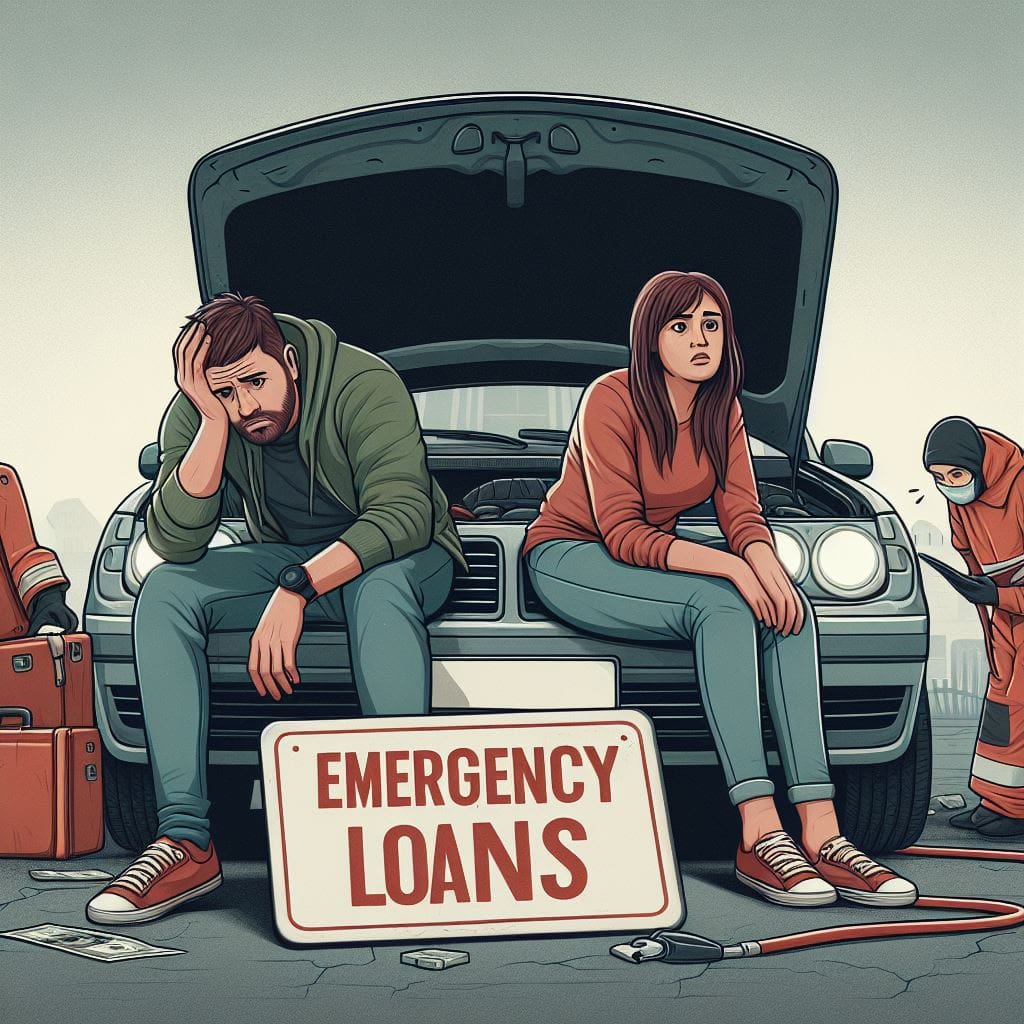Overview of Emergency Loans
What Are Emergency Loans?
Emergency loans are short term financial solutions designed to cover unexpected expenses or urgent financial needs. These loans are typically easy to apply for and can provide quick access to funds when you need them the most.
Why Are Emergency Loans Important?
Emergencies can strike at any time and having access to quick financial support can be crucial. Whether it’s a medical emergency, urgent home repairs, or sudden job loss, emergency loans can provide the necessary funds to manage these situations without causing long term financial strain.
Types of Emergency Loans
Personal Loans
Personal loans are versatile and can be used for various emergency situations. They typically offer lower interest rates compared to other types of emergency loans and have a fixed repayment schedule. Interest rate will usually be somewhere between 5-15%pa
Payday Loans
Payday loans are short term, high interest loans intended to be repaid with your next paycheck. While they can provide quick cash, the high interest rates and fees make them a more expensive option. Rates between 40-100%pa. These are loans of last resort, be careful!
Credit Card Cash Advances
Using a credit card for a cash advance is another option. While this can provide immediate funds the interest rates are usually high, and there’s often a cash advance fee. Rates between 25-35%.
Online Loans
Online loans can be a quick and convenient option, with many lenders offering instant approval and same day funding. However, it’s important to research and choose a reputable lender. Rate will depend on the lender and customer credit profile.
Logbook Loans
Logbook loans are secured loans where you use your vehicle title as collateral. These can provide quick access to cash but come with the risk of losing your vehicle if you cannot repay the loan. Rates could be anywhere between 5-50%pa depending on risk profile.
Can You Get an Emergency Cash Loan Quickly?
Speed of Approval and Funding
Many emergency cash loans are designed to provide funds quickly, often within the same day or the next working day. Online lenders, payday lenders, and credit card cash advances are typically the fastest emergency loans options.
- Online Lenders: Many online lenders offer quick approval processes, with some even providing instant decisions. Funds can be deposited into your account within hours or the next working day.
- Payday Lenders: Payday loans are known for their speed, often providing cash on the same day, especially if you apply in person.
- Credit Card Cash Advances: If you already have a credit card, a cash advance can be immediate, though you’ll likely face high interest rates.
Considerations for Quick Loans
While the speed of funding is a major advantage, quick loans often come with higher interest rates and fees. It’s crucial to read the terms and conditions carefully and ensure that you can meet the repayment terms to avoid falling into debt.
Relevant UK Resources
Can I Get an Emergency Cash Loan from New Payday Lenders?
Overview of New Payday Lenders
New payday lenders have emerged in the market, offering competitive terms and more flexible options compared to traditional payday lenders. These lenders often leverage technology to streamline the application process and provide faster approval times.
Advantages of New Payday Lenders
- Quick Approval: New payday lenders often offer fast and efficient online application processes, which can lead to quicker approvals.
- Flexible Terms: Some of these lenders provide more flexible repayment options, allowing borrowers to choose repayment schedules that fit their needs.
- Lower Fees: With increased competition, some new payday lenders may offer lower fees and interest rates compared to traditional payday lenders.
Risks and Considerations
- Regulation: Ensure that the lender is regulated by the Financial Conduct Authority (FCA) to protect yourself from predatory lending practices.
- Interest Rates: While some new lenders may offer competitive rates, payday loans are still generally expensive. Make sure to compare different options.
Relevant UK Resources
Benefits of Emergency Loans
Quick Access to Funds
Emergency loans are designed to provide fast financial relief. Many lenders offer same-day or next-day funding, making it possible to address urgent needs promptly.
Easy Application Process
Applying for an emergency loan is typically straightforward, with many lenders offering online applications that can be completed in minutes.
Flexibility
Emergency loans have many benefits and can be used for a variety of purposes, from medical bills to home repairs, providing the flexibility to address different types of emergencies.
Using Short Term Loans for Emergencies
Feasibility and Considerations
Short term loans can be a viable option for emergencies if used responsibly. It’s important to understand the terms and conditions, including the interest rates and repayment schedule, to avoid falling into a debt cycle.
Pros
- Quick approval and funding
- Can cover immediate expenses
Cons
- High interest rates
- Short repayment terms
Recommended Emergency Cash Savings
How Much Should You Keep?
Financial experts recommend keeping an emergency fund that covers 3 to 6 months’ worth of living expenses. This can help you avoid the need for high-interest emergency loans in many situations.
Building Your Emergency Fund
Start by setting aside a small amount each month and gradually increase your savings. Automating your savings can help make this process easier and more consistent.
Defining Emergencies
What Qualifies as an Emergency?
- Medical Emergencies: Unexpected medical expenses or procedures.
- Home Repairs: Urgent repairs such as a broken boiler or leaky roof.
- Car Repairs: Necessary repairs to keep your vehicle running.
- Unexpected Job Loss: Covering living expenses while searching for a new job.
What Doesn’t Qualify as an Emergency?
- Non-essential Purchases: Luxury items or non-essential travel.
- Planned Expenses: Expenses that can be anticipated and saved for in advance.
You have come to the end of our Comprehensive Guide to Emergency Loans and hopefully you have found it to be both informative and comprehensive. If you’ve got any questions about this or any other loan related query send us an email at: [email protected]. Thanks for reading!


